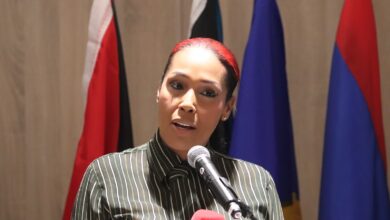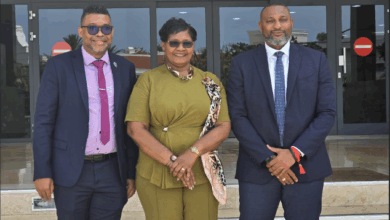(CARICOM Secretariat, Turkeyen, Greater Georgetown, Guyana) The Caribbean Community (CARICOM) Secretariat in collaboration with the Joint United Nations Programme on HIV/AIDS (UNAIDS) and the Pan-Caribbean Partnership against HIV/AIDS (PANCAP), is currently sponsoring a series of Consultations for PANCAP Member Countries on Universal Access to HIV Prevention, Treatment, Care and Support. These Consultations are part of a global response to accelerating the processes towards the achievement of Universal Access to HIV Prevention, Treatment, Care and Support, by 2010, an initiative broadened at the 2005 Summit on the Millennium Development Goals, to include all United Nations (UN) Member States.
The goal of these Consultations is to arrive at a consolidated regional position which will be presented to the UN General Assembly Special Session on HIV/AIDS, scheduled for 2 June 2006. All stakeholders engaged in the fight against HIV/AIDS were invited to participate in these Consultations, including non-governmental organizations, representatives of faith-based organisations, PLWA, government representatives, and the private sector.
The first of these Consultations, the Organisation of Eastern Caribbean States (OECS) Sub-Regional Consultation, was held in Saint Lucia on 23 and 24 January 2006. In his opening remarks at the OECS Sub-regional Consultation, Dr. Edward Greene, Assistant Secretary-General, Human and Social Development at the CARICOM Secretariat, and Deputy Chair of PANCAP pointed out that the main objectives of the Meeting included the identification of the principal elements of an OECS Plan of Action to scale-up the process towards Universal Access and to consider the mechanisms needed at the Sub-Regional level to give effect to this Plan.
Dr. Vasantha Chase, Director, Social and Sustainable Development, OECS Secretariat, noted the timeliness of the Meeting in the context of the establishment of a team in the OECS to accelerate implementation of HIV/AIDS activities.
The second Sub-Regional Consultation, targeting the Sub-Regional grouping of the Spanish, Dutch and French PANCAP Member States and the United Kingdom Overseas Territories, is currently being held in Philipsburg, Saint Maarten, Netherlands Antilles, 26 and 27 January 2006.
In his opening remarks Dr. Greene said that the CARICOM Secretariat is pleased to be part of this consultation in Saint Maarten which provides this Sub-Region with a golden opportunity to precisely define the elements of a Universal Access plan that will benefit the citizens, in particular, People Living With AIDS (PLWA).
Dr. Rachel Eersel, Head of the Preventive Health Department of Saint Maarten, in welcoming the group to this morning’s Meeting, stressed the importance of participants sharing the experiences of their individual countries, thereby benefiting from obstacles overcome or presenting new insights.
Both Consultations resulted in a number of recommendations to be carried forward to the Regional PANCAP Consultation to be held in Jamaica 14-15 February 2006. These include, strengthening HIV/AIDS networks, establishing mechanisms for sharing resources, advocating a national health insurance scheme, mainstreaming HIV/AIDS in sector planning, strengthening the health care systems to cope with demands for care and treatment, achieving quicker turnaround time for HIV test results, increasing access to voluntary counseling and testing, and strengthening monitoring and evaluation capabilities.
In both Saint. Lucia and Saint Maarten, the CARICOM/PANCAP representatives took the opportunity to engage in special sessions with the Dutch, French and UK OCTs and their OECS counterparts, to formulate strategies for collaboration in the fight against HIV/AIDS. In both cases, the major agreements include strategies for harmonisation of resources, collaboration in the accelerated implementation of programmes, more effective communications and information sharing, joint approaches aimed at the reduction of stigma and discrimination, greater access by PLWA to care and treatment, and greater involvement of PLWA in the planning and implementation of programmes at the national and regional levels.





